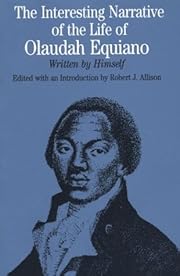

Click on a thumbnail to go to Google Books.
|
Loading... The Interesting Narrative of the Life of Olaudah Equiano: Written by Himself (1789)by Olaudah Equiano, Robert J. Allison (Editor), Joanna Brooks (Editor)Olaudah Equiano (?-1707) was kidnapped from his home in Nigeria in 1745, brought to Virginia on a slave ship, then sold to a British Naval Captain. They sailed to England where Olaudah went to school in London. Captain then sold him to a Quaker and he bought his freedom. During his life he was over and over betrayed by his former maste and other white menr as they traveled the ocean and back He submitted his written Narrative to the Queen. He worked hard to abolish slavery, describing to all who would listen in England all that he had witnessed of the "...tortures, murders, and every other imaginable barbarity..." (Still not sure why he never learned to swim when he spent so much of his life at sea.) This is one of the, if not THE, first slave narrative to be recorded by an actual slave. This book would be challenging for high school students. However, I feel that students would gain both a historical perspective along with examining larger themes that can be applied to other literary texts. I think that using literature that has a historical setting is a good way to get students accustomed to viewing issues with the idea of other perspectives in mind. By using books that are all or part a historical narrative as much as a literature one, students gain the skills of using their critical thinking abilities developed form the study of other novels to the real world and the histories we all evolve from. |
Current DiscussionsNonePopular covers
 Google Books — Loading... Google Books — Loading...GenresMelvil Decimal System (DDC)973History & geography History of North America United StatesLC ClassificationRatingAverage: (3.41) (3.41)
Is this you?Become a LibraryThing Author. |
There is a lot of heartbreak in this account. How could there not? One thing I will recognize informs my high esteem of this story is the religious tone it uses. Equiano was what we'd call a true believer, and it's one more layer of interesting given the broader imperialism of Christianity. I implore the less religiously inclined to not fault him; I think it is incredibly dehumanizing to question this too much. His Christianity gave him strength, gave him a strong moral compass to battle for the abolition of the slave trade, and allowed him many great connections in a world where being black could be so tenuous. His Christianity was truly beautiful and made me yearn for church once more—Crazy how good, upstanding people can convert, no?
On a side note, the more I read 18th-century writing, the more I really think the period of the 1770s-1790s was the pinnacle of the written English word. The command of language Equiano employs is exquisite and commanding, and really quite arresting when relaying his life. It's a bit similar to how Du Bois' utilizes language a century later—both men show the "mental faculties" so many suppose they can't have on account of their skin.
Anyway, I can't recommend this enough. It's just... amazing. Equiano is a fascinating man caught between two worlds, and while his 18th-century Britishness can raise an eyebrow sometimes, it illustrates the breadth of thought of the period. I just spent an hour on York University's webpage about him, and I can't get enough. Ah! (